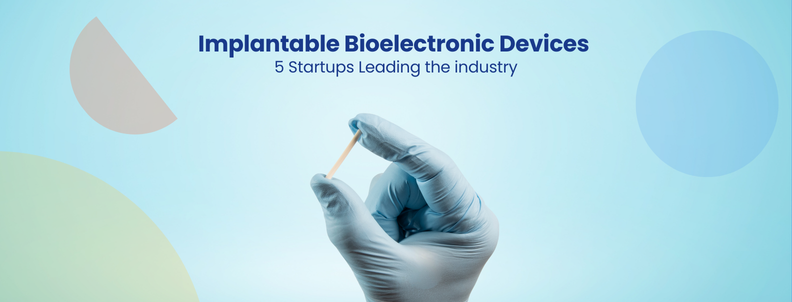Current medical implants often have poor biocompatibility, which can cause immune reactions and infections. Furthermore, the “one-size-fits-all” approach will not work with some individuals with specific needs or unique physiological conditions.
Bioelectric implants, on the other hand, have enhanced biocompatibility and operational sustainability. These implantable devices are smaller, softer, and less vulnerable to the foreign-body response.
These devices use the body’s innate electrical systems to treat diseases, track patient status, and restore tissue and organ function. These advancements can eliminate the need for certain drugs and expensive procedures, offering precise, localized, and focused regulation of disease pathways.
This article discusses five innovative implantable bioelectronic device startups that could offer precise, personalized, and continuous treatment or monitoring that can significantly improve quality of life, manage chronic conditions, restore lost functions, and even save lives in emergency situations.
These growth-stage startups could be best for collaboration or acquisition for big medical device companies.
1. Neuraura
| Founding Year | 2017 |
| Headquarters | Calgary, Canada |
| Total Funding Amount | CA$1M |
| Last Funding Round/Amount | Pre-Seed round |
| Website | neuraura.com |
Neuraura has developed a microsensor that monitors brain activity better than ever before. They have also developed a brain platform for detecting and diagnosing electrophysiological brain data. This platform records the data and enables neurologists to make informed decisions.

The startup is developing various patented technologies, from micro-sensors to cortical electrodes and insertion tools. Their microsensors are designed based on world-leading expertise in neuro-engineering and microfabrication.
Neuraura’s sensors offer very low noise and 100% detection of seizures. At 1/5th of the diameter of a human hair, Neuraura’s fabrication method can be added to various substrates to enable minimally invasive surgeries.
The CEO, Claire Dixon, has over 25 years of experience in international leadership, strategy, and operations. Claire holds an MBA from Harvard Business School and an MEng/MA in Mechanical Engineering from Cambridge University, UK.
Neuraura has raised a total of CA $1M in funding. Their latest funding came from a pre-seed round on Jan 7, 2021.
2. Motif Neurotech
| Founding Year | 2022 |
| Headquarters | Houston, Texas |
| Total Funding Amount | $18.9M |
| Last Funding Round/Amount | Series A / $18.75M |
| Website | www.motifneuro.tech |
Motif Neurotech is a medical equipment manufacturing company that develops minimally invasive bioelectronic implants for monitoring and treating severe mental illnesses.

Their lead product is the DOT microstimulator, a miniature brain pacemaker designed to precisely stimulate the brain to restore healthy circuit activity and treat mental health disorders. Motif is pursuing treatment-resistant depression as the device’s initial target.
This wireless, battery-free device is designed to be implanted in a 20-minute outpatient procedure and offers the capability for at-home therapy. Their unique approach leverages wireless magnetoelectric power transfer technology to create new miniature implants for tissue stimulation and diagnostic readings.
The company’s efficient wireless power and data innovations have unlocked possibilities for new miniature implants for tissue stimulation and diagnostic readings, particularly for treatment-resistant depression.
The CEO, Jacob Robinson, is a Ph.D. holder from Cornell University and a Postdoctoral Fellow at Harward on Nanobio Interfaces. He’s been a professor at Rice University for the past 11 years.
Motif Neurotech has raised $18.9M in funding, the latest from a Series A round on Jan 24, 2024.
Intrigued by these implantable bioelectronic device startups?
Subscribe for insights into more such startups solving core industry challenges.

3. Boomerang Medical
| Founding Year | 2021 |
| Headquarters | California, United States |
| Total Funding Amount | $18M |
| Last Funding Round/Amount | Series A/$15M |
| Website | www.boomerangmedical.com |
Boomerang Medical is a women-led medicine company developing a bioelectric neuromodulation technology. The FDA has granted this technology Breakthrough Device Designation for treating Crohn’s disease and ulcerative colitis.
Inflammatory Bowel Disease (IBD) is one of the most debilitating autoimmune diseases, affecting millions globally. Living with Crohn’s disease or ulcerative colitis impacts not just physical health but also work and relationships. Current treatments include medications and surgery, but the condition’s complexity means there is always room for innovative approaches.
Boomerang Medical is focusing on neuromodulation, a promising frontier in bioelectronic medicine. Through bioelectronic medicine, they harness the body’s physiology to manage inflammation and immune response. This innovative approach is being evaluated in an FDA-approved clinical trial at leading IBD centers in the US.
The CEO, Heather Simonsen, is an MBA graduate from DePaul Driehaus College of Business. She’s an industry expert with nearly 30 years of experience in the healthcare field.
Boomerang Medical has raised a total of $18M in funding. Their latest funding was raised from a Series A round on Nov 1, 2022.
4. Panaxium
| Founding Year | 2016 |
| Headquarters | Aix-en-Provence, France |
| Total Funding Amount | Not available |
| Last Funding Round/Amount | Venture series round |
| Website | www.panaxium.com |
Panaxium is a bioelectronic medicine company that develops AI-enabled iontronic devices for neurological diseases.

Their proprietary brain-machine interface (BMI) platform is built for surgeons and neurologists to directly intervene, treat the injury, and leave the patient to return to normalcy. This platform is designed to guide the remapping of damaged functions to healthy brain regions.
The startup’s proprietary MRI protocol and AI-assisted analysis identify specific disruptions from damage, predict natural recovery, and aid implantation.
Their CEO, Brad Schmidt, is an experienced medtech entrepreneur with nearly three decades of startup experience. He holds a Ph.D. in Computer Engineering from Cornell University.
Panaxium’s latest funding was raised from a Venture Series round on Apr 10, 2023. The exact amount is not disclosed.
5. Salvia BioElectronics
| Founding Year | 2017 |
| Headquarters | North Brabant, The Netherlands |
| Total Funding Amount | $34.6M |
| Last Funding Round/Amount | Grant |
| Website | www.salviabioelectronics.com |
Salvia BioElectronics is a medical device company that develops neuromodulation therapies for migraines. It has developed a paper-thin implant that delivers gentle electrical pulses to specific nerves to reduce the frequency and intensity of migraine attacks. The company is currently in the clinical stage of development.
The implant is a flexible bioelectronic foil placed just under the skin near the nerves associated with migraine. By sending these electrical pulses through the foil, the implant aims to calm the nerves effectively and prevent and relieve migraine symptoms.

This approach is called neuromodulation, which has been successfully used to treat individuals suffering from various neurological conditions, including Parkinson’s disease and epilepsy.
Their bioelectronic foil, designed specifically for the anatomy of the head, can be implanted in the front or back of the head, just under the skin, providing a safe and direct connection to the nerves associated with migraine.
Their CEO, Hubert Martens, is a medtech entrepreneur with over a decade of startup management experience. He graduated from Leiden University with a Ph.D. in Physics.
Salvia BioElectronics has raised a total of $34.6M in funding. Their latest funding came from a Grant round on February 28, 2024.
Partner with cutting-edge startups to tackle your industry’s toughest challenges and stay on top of the competition.
Learn how we can help you discover similar ventures that perfectly fit your needs.

Authored by: Hemanth Shenoy, Market Research










